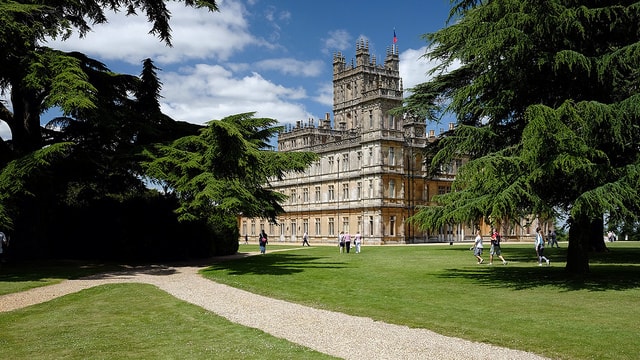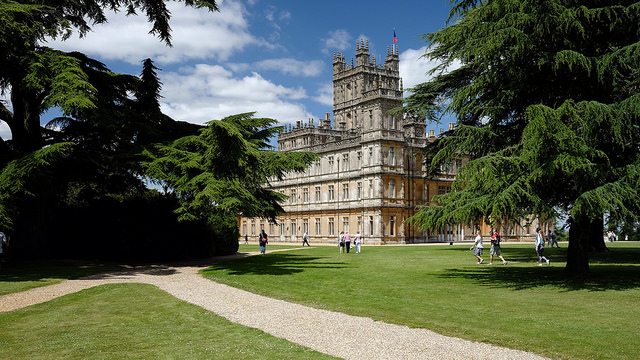
As I struggled through one of the revisions of my novel,
I could have shouted to my then-wife to turn it down, but I decided to let the caterwauling continue. Protest would have been futile anyway, and it was a useful reminder of what I was trying not to write—an England that seems to exist largely for American audiences.
In literature and film, Britain was a nation either made up of the aristocracy or for it, and either way besotted with it.
As a junior in college, I left for the United Kingdom in the fall of 1985 with only the sketchiest concept of the country in mind. I had never left the United States at that point in my life.
“He must be a king,” Eric Idle said as Arthur clopped through a filthy Middle Ages village with his coconuts in The Holy Grail.
“Why?”
“Cuz he hasn’t got shit all over him.”
What I found at the University of Sussex that year was a Britain almost beyond class and empire, mired in stasis and ill humor. Billy Bragg was singing, “This is the 51st State of the United States.” Age of Chance was turning Prince’s Kiss into angry punk. The Revolutionary Communist Party jostled on campus with the Spartacus Youth League as students planned the next sit-in at the administration building or assault on Barclay’s Bank. Off campus, we sat on the floors of rancid Brighton flats and debated where the best housing allowances or the most generous dole could be had after graduation. Weekends were spent in London, marching and singing, “All We Are Saying Is Give Us Our Grants.” No one—and I mean no one—talked of career or work after university. Graduate school was the mark of ambition.
Student housing was divided into flats, not dorms, eight people to an apartment of sorts. In mine, only one guy might have been considered mildly wealthy. He dressed in rumpled khakis, a white sweater tossed around his neck over a pressed linen shirt. He played the synthesizer. It was through him that I learned that the lush, ethereal sound of eighties electronica took no particular musical talent to reproduce, although lovely coeds cooing nonsense into microphones could hardly replicate The Cocteau Twins. What stood out about him was his otherness. He was the outsider. He was mocked as a posh poseur. The fact that he actually paid tuition was an object of contempt. His Depeche Mode-like act was booed out of Sussex’s battle of the bands, dominated by punk and metal outfits.
“That’s alright,” he confided in me confidently. “A bloke from The Zap Club came up after and said I could play there any time.”
He never did.
Of course this world would come crashing into pop culture.
Yet in the United States, year after year, the Downton Abbeys keep coming. At any given moment, in your local art-film multiplex, there will be at least one British costume drama featuring women in bonnets, their hands extended in earnest longing from some horse-drawn carriage plodding through mist-filled countryside.
As No. 4 Imperial Lane tumbled out of my brain, I tried to find some intersection between these two worlds, an aristocracy, sure, but one in its dying twilight, overwhelmed by a gruffer, rougher world around it that did not care about it in the least. The students in the novel would have some British reserve, but in the affected service of cool, not because they were somehow born without affect. Maggie, the American narrator’s British girlfriend and daughter of working class parents, is embarrassed for Bono as he croons in anguish over his drug-addled friend in the U2 song Bad. She isn’t embarrassed by him.
You could at least imagine a new future emerging, one without pretension or costume.
The British Empire crumbled in the aftermath of World War II and was all but gone by the early 1960s. The nation of Churchill, of Tennyson, of Stanley and Livingstone was long forgotten.To stand on Brighton Pier and look out to sea was once to imagine the grandeur of Pax Britannica. By the time David Heller, the book’s narrator, arrives, it was simply Empire’s End, the bottom of Britain. This was the context of Thatcher’s England. David, finds, as did I, a sullen nation with its grandeur gone long enough for the weeds to be poking through the cracks. But the energy of the punk era was infectious. Between the resurgence of British youth culture and the Dominatrix demands of Margaret Thatcher, you could at least imagine a new future emerging, one without pretension or costume.
I wanted to write a book where Britain wasn’t a character hatched from Imperial costume drama—not E.M. Forster or even V.S. Naipaul—but something new to American audiences.
I do not mean to question the authenticity of works like
He once asked me, “Why did you come here anyway? We’re just a pathetic little island.”
They are more recognizable than that: the struggles of immigrants and their children, the stagnation of wages, the soaring wealth of the banking and consultant classes in the City of London and how they have priced housing out of reach of everyone else. Perhaps that is the problem. Those issues may be all too real for audiences.
One of the lesser characters in No. 4 Imperial Lane, Big Steve, is based on a guy I really met my year in Brighton. He came from the working class town of Leighton Buzzard, paid nothing for tuition, wore his hair in a spiky purple Mohawk, and dressed only in worn combat pants and Doc Martens. He once asked me, “Why did you come here anyway? We’re just a pathetic little island.”
To an American audience, though, it is still an island of great mythology, of vast estates, flat-roofed manors, dragon keepers, and swordsmen. But, I’d argue, its appeal is just as strong when it’s the real thing, when it comes splashing back to Earth, even in a fluttering of pages.

